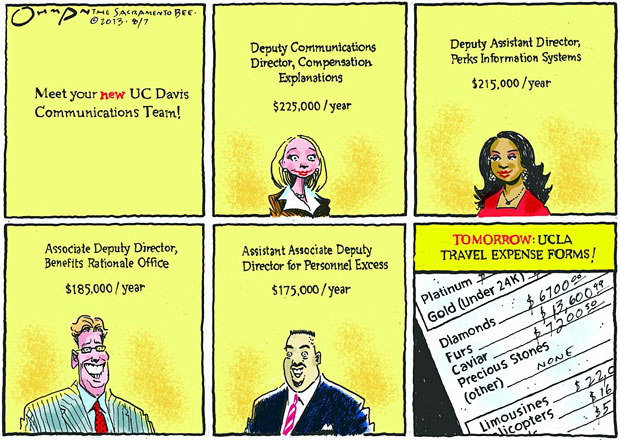Editorial: UC can’t gripe about cuts while padding pay

By the Editorial Board
Declining state support for public education is a well-worn complaint of University of California leadership, and understandably so.
UC officials have used this scapegoat to justify controversial tuition increases, ballooning class sizes and record-breaking undergraduate enrollment, including recruitment of more out-of-state students. But while UC administrators are right to speak out against state disinvestment, that message gets lost when they continue to jack up salaries and expenses among their own ranks.
This is particularly clear in two recent instances of executive excess – the first reported by the Center of Investigative Reporting on the high cost of executive travel at UCLA, and the second documented by The Bee’s Phillip Reese on the record compensation of UC Davis’ new communications chief.
In its investigation, the CIR outlined a long list of luxurious accommodations expensed by administrators while on trips to court wealthy donors. Between 2008 and mid-2012, one administrator alone ran up $647,000 in travel costs, the CIR reported.
At UC Davis, new associate chancellor for strategic communications Luanne Lawrence will collect an annual salary of $260,000, a system-wide record for her position, putting her among the highest-paid employees on that campus.
Against the backdrop of budget cuts, UC officials in recent years have made much of the growing role of donor support for the public university. Officials claim they need to pay out high salaries and dole out lavish expenses as part of a broader mission to preserve the world-class profile of the UC system and expand support for the university.
But $647,000 is not an expense tab within reason for a single university employee and her fundraising adventures, even over several years.
UCLA maintains that the employee in question, Judy Olian, dean of the Anderson School of Management, brought in $118 million in the four-year period analyzed by the CIR. If that is the case, would UC have been OK with Olian if she had spent $20 million in expenses? Where would she cross the line? And if Olian had not taken an $842 limousine ride to and from Los Angeles and San Diego to take part in a donor’s birthday celebration, would the university have raised less money than if she had found transportation (perhaps a plane, train or automobile) more befitting to a public employee?
And if Linda Rosenstock, the former dean of the UCLA School of Public Health, had not stayed in a room that cost $724.75 per night during a conference in Key Largo, Fla., would she have been any less effective a representative at the event?
In the case of UC Davis, universities officials say Lawrence is filling a new position, with broader strategic responsibilities than her predecessor, so a higher salary is justified. But where does this stop, and how much money should UC Davis be spending on communications, as opposed to teaching and research, its core mission? Does the workload of a new public relations employee really merit more salary than that paid to the state’s governor?
California’s top politicians pushed for passage of Proposition 30 last year on the promise the tax hike would limit tuition increases. Voters did not approve Prop. 30 to support bloated UC salaries and lavish expense accounts. If some voters now have buyer’s remorse, nobody should be surprised.
[Source]: The Sacramento Bee


